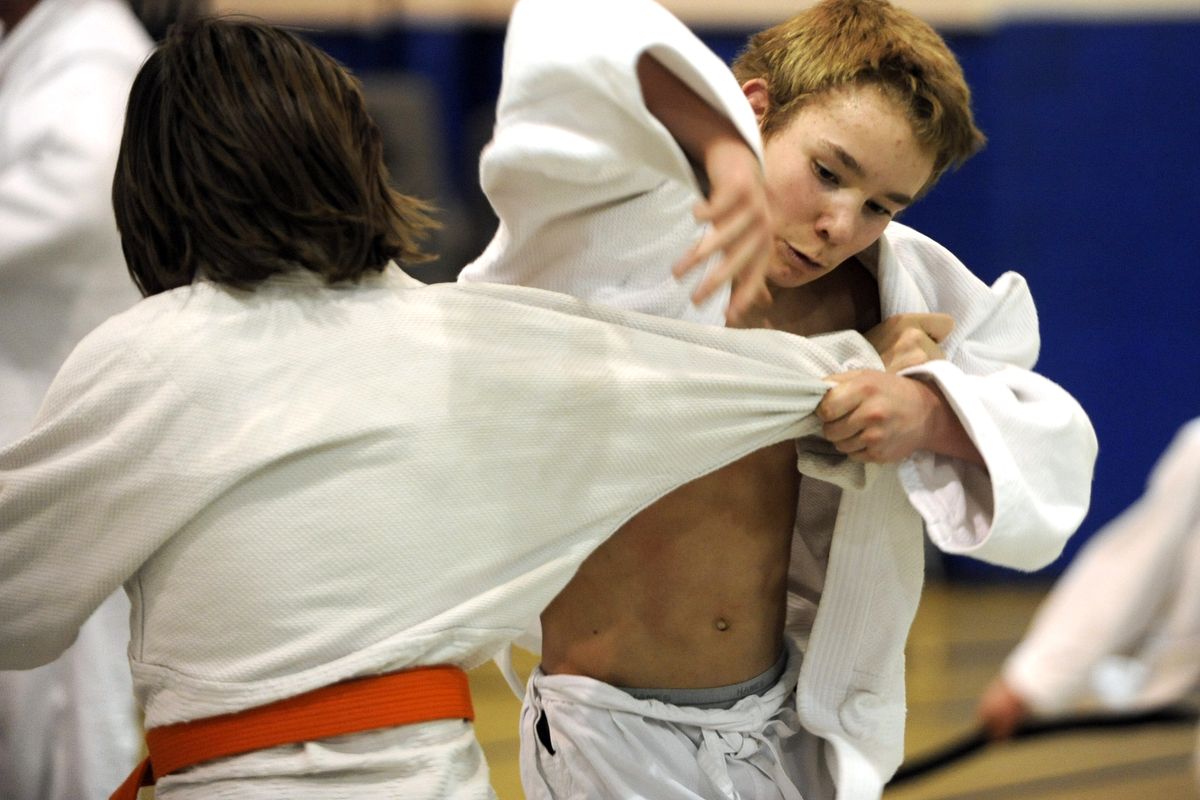Spokane Judo students preparing for national competition

Say “martial arts” and most people think of flying Ninjas or big grunting men breaking bricks with their heads.
Judo is not at all like that. Actually, on this Wednesday evening at Spokane Judo’s practice at East Central Community Center, giggling can be heard more than anything else.
About two dozen people of all ages are tumbling around in pairs on the big wrestling mats in the gym.
Sensei Brett Lewis walks among everyone and occasionally stops the group activity to demonstrate a particular throw or hold, often together with a student.
Lewis started judo when he was just 7, then took a break and got back into it at 13. Today, at 43, Lewis moves with ease and composure among his students, as he directs them through matches and exercises.
“I was attracted to judo for many reasons, one of them being that it’s one sport where they barely change the rules for blind people,” Lewis said. Blind? Yes, Lewis is blind, but many don’t notice the first time they see him on the mat. Of course he relies on other senseis – or masters – to monitor the whirl of white-clad students around him, but when it comes to a one-on-one judo matchup, Lewis fights just like everyone else.
“My sense of where the other person is, my sense of balance and leverage is exactly like that of a seeing person,” Lewis said. “When they know you are blind, sometimes they let you touch the other person’s hands when you start. But that’s the only difference.”
One time, when Lewis was at judo camp as a teen, an opponent was being a smart aleck and hiding behind his back instead of coming at him from the front.
“All the kids were booing and yelling, ‘He’s behind you!’ ” said Lewis. “They didn’t want him to win by cheating.”
Three of Lewis’ students are competing at this weekend’s USA Judo and Scholastic National Championships at the Hub Sports Center in Spokane Valley.
One of them is Jaime Kobara, 16, a junior at Cheney High School who’s only practiced judo for a little more than a year.
“I was looking for some different sports to do and I found judo on Google,” Kobara said. “I’m also a wrestler and I heard that judo could help me with my wrestling moves.”
It’s her first time at a tournament.
“I’m a little nervous,” Kobara said, “but I’m going to try to win.”
Jesse Kitterman, 14, is a student at Freeman Middle School who started judo six months ago.
“I always wanted to do martial arts, it’s very cool,” said Kitterman.
This weekend’s tournament is his second – he placed second at a tournament in Seattle in November.
“I’ve gotten a lot stronger and my cardio has gotten so much better,” said Kitterman, who also wrestles and plays football. “Mostly, judo is fun – I think everyone should try it.”
The last of the three is Jeremiah Schmick, 17, a senior at Ferris High School. Like Kitterman, he returned with a second place from the tournament in Seattle and he’s looking forward to competing again.
“I see my progress a lot more in this sport than in anything else I’ve been doing,” said Schmick. “I wrestled for five years and decided to try judo – now I don’t wrestle anymore.”
Like other types of martial arts, judo is about controlling the opponent but there are no chops or kicks in judo.
“There is no hitting in judo,” said Schmick. “You stay on your feet, you’re in the game. You throw someone on their back and you win – or you hold them in a choke hold or bar their arm, on the ground, and you win.”
Judo is very different from wrestling, Schmick said.
“For some reason I don’t get as frustrated with judo as I have been getting with other sports,” he said.
Lewis explained that judo was developed in 1882 by Jigoro Kano. It’s based on other martial arts, but it doesn’t have a strong spiritual component.
“Some martial arts are almost Buddhist, but judo is developed to be a sport,” said Lewis. “Kano talks a lot about the mutual benefit for everyone involved in judo, it’s very physical, it may not be spiritual but it’s about self-discipline.”
The word judo means “the gentle way” or “the way of gentleness” exactly because there is no hitting or kicking allowed.
“It is all about leverage,” said Lewis, “and balance.”
And it’s an individual sport.
“It’s just you out there on the mat, there’s no team to blame it on if things go bad, and some people don’t stick with it when they lose,” said Lewis. “But if you can leave the match knowing you’ve done the very best you could, well, then there’s really nothing wrong with losing.”